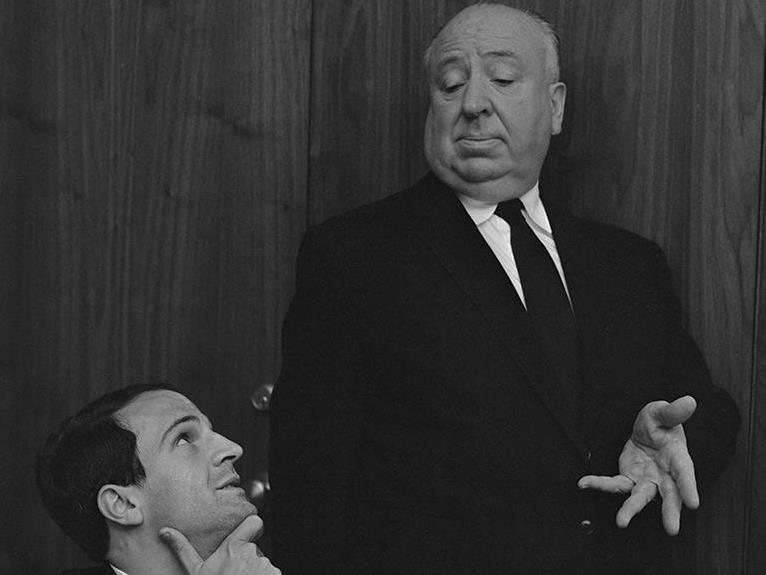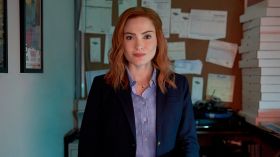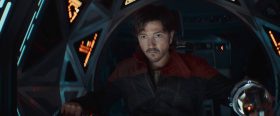François Truffaut and Alfred Hitchcock. Curious Distribution.
Today, Alfred Hitchcock is considered one of cinema’s all-time masters – and a worthy subject of affectionate analysis devoted to his prolific and influential screen output. And yet, though his name was well known and many of his thrilling movies widely watched, during the auteur’s heyday he was seen as a peddler of entertainment rather than art.
Enter a fellow great in the form of critic turned French New Wave director François Truffaut, who when they met in 1962 had three features to his name compared to his idol’s more than 40.
That meeting was a powerful cinema moment. The pair conversed for a week, with the assistance of translator Helen Scott, and the content of these extended conversations became the 1966 book Hitchcock/Truffaut, a work that helped reshape the way that the master of suspense is regarded.
In this film treatment, New York Film Festival director of programming and history-focused documentarian Kent Jones (A Letter to Elia) provides the context behind Hitchcock and Truffaut’s discussion and the publication that followed, complete with photographs and sound clips of their banter.
His reverence for Hitchcock infuses every frame. It is with a loving eye that he guides an accompanying on-screen appreciation that cleverly morphs into a detailed investigation of several of Hitchcock’s key works, while just as shrewdly adds another layer: the thoughts and reflections of ten contemporary filmmakers.
If Hitchcock/Truffaut, the book, marked the coming together of two formidable cinema talents, then Hitchcock/Truffaut, the movie, amplifies the experience by throwing David Fincher (Gone Girl), Paul Schrader (The Canyons), James Gray (The Immigrant), Olivier Assayas (Personal Shopper), Peter Bogdanovich (She’s Funny That Way), Wes Anderson (The Grand Budapest Hotel), Kiyoshi Kurosawa (Journey to the Shore), Arnaud Desplechin (My Golden Days), Richard Linklater (Everbody Wants Some!!), and Martin Scorsese (The Wolf of Wall Street) into the mix. Ruminating upon Vertigo, Psycho, and The Wrong Man in particular, as well as Hitchcock’s impact in general, they extend Truffaut’s adoration into the 21st century, as supplemented by narration written by Jones with Serge Toubiana (helmer of the 1993 documentary François Truffaut: Portraits voles) and voiced by actor Bob Balaban (TV’s Show Me A Hero).
Of course, arguing about Hitchcock’s merits isn’t the aim of a feature focused on a text that sings his praises; further understanding them, as filtered through his standing with a selection of his modern-day equivalents, is. Accordingly, while Kent leaves no room for dissent, he approaches his task with depth on his mind, and subsequently crafts an offering that’s part tribute, part dissection. Every laudatory statement is packaged with probing lines of enquiry, such as Fincher’s contemplation of the perversity of Vertigo, Scorsese’s breakdown of the choice of framing in Psycho‘s infamous driving scene, and Linklater’s comments about Hitchcock’s need for control rather than spontaneity. For existing aficionados and casual viewers alike, the end product combines the breeziness of a brisk career overview with the breadth of becoming immersed in its subject’s oeuvre — and his themes, motivations, casting, style, methods of construction, and many subsequent interpretations of all of the above, too — in a more substantial manner.
As to-camera chats, archival footage, and snippets of everything from 1927’s The Lodger to 1969’s Topaz come together, also evident is a command of the form behind the film. Indeed, just as Hitchcock employed every tool at his disposal to heighten the effect of his own output, Kent is purposeful, commanding, and showy when the occasion calls for it as he weaves together not only his intellectual content, but the images that go with it. As a result — and courtesy of the considerable efforts of editor Rachel Reichman (Women, War & Peace) — Hitchcock/Truffaut becomes more than just an examination of an important book and the filmmaker at its centre, or even an adaptation of it. It remains both, but it also proves a manifestation of the passion that cinema sparks, as exemplified by one of the most significant acts of filmic obsession in the medium’s lifetime.
Rating: 4 stars out of 5
Director: Kent Jones
France | USA, 2015, 79 mins
Release date: July 21
Distributor: Curious
Rated: PG
Actors:
Director:
Format:
Country:
Release:





